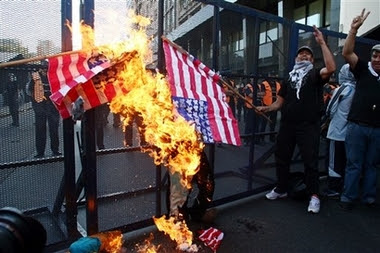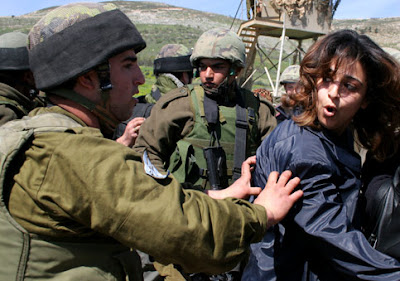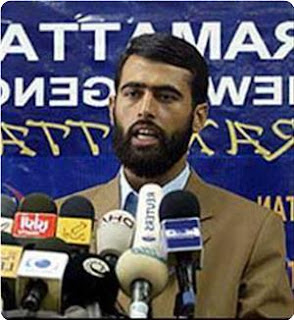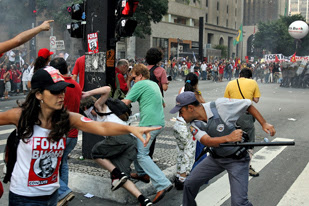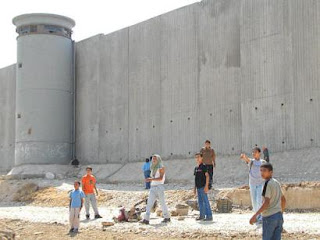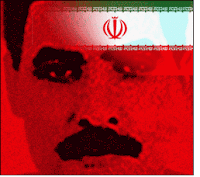 By Kurt Nimmo
By Kurt Nimmo"
If anything can be said about the neocons and the Israelis, it is that they are tenacious, they are completely dedicated to the “creative destruction” plan in the Middle East, and short of arrest, conviction, and imprisonment they will not rest. It can be said that the deception game launched in the lead-up to the invasion of Iraq by these dedicated traitors was at best sloppy, as it was easy to pick apart the “facts” spoon-fed to the corporate media by the neocon lie factory known as the Office of Special Plans. Of course,
at the end of the day, the fact this effort was at best slipshod was of little concern because the neocons understand well the intellectual lassitude, the habitual indifference of the average American, unable or unwilling to give a whit about the future of the country or, for that matter, the future that will be suffered by his own family.
Once again, the corporate media is feeding us a main course of half-truth and fabrication as the neocons and Israelis prepare to invade Iran, the next target on their total destruction roster. “A high-ranking Iranian general who may have defected is in Northern Europe,
where he is being questioned about Iran’s role in the 1983 bombing of the U.S. Marine barracks in Beirut and other terrorist acts,” the
neocon New York Sun tells us. “Ali Reza Asghari, 63, whose grim face was displayed on Israeli TV last night, was spilling valuable secrets to an American intelligence team as a prelude to defecting to the United States,”
the CIA’s favorite newspaper, the Washington Post, reports. “Asghari was Iran’s deputy minister of defense and former top official of the notorious Revolutionary Guards. Experts said his secrets, should they fall into American or Israeli hands, could have devastating consequences for the Iranian regime.”......
“In a scene straight out of a John le Carré spy novel, Asghari disappeared Feb. 7 from an Istanbul hotel where he was staying on a private trip —possibly with his family—and has vanished without a trace.” According to the Australian, taking its reportage leads in Jerusalem, Asghari “defected and sought asylum in the US,” taking along his family, although this is not confirmed.
Naturally, for suspicious types as your humble blogger, well-steeped in history and possessing a honed skill of reading between corporate media lines,
the obvious conclusion here is that Asghari was abducted while on vacation with his family in Turkey—likely by the Mossad, CIA, a combination of both, or by way of freelance contracted by the aforementioned. “It is likely Asghari has been abducted by Western intelligence services,” said Iran’s top police officer, General Esmaeil Ahmadi Moghaddam.......
 However, this does not explain the initial report, carried in the Washington Post and Israel’s Yedioth Ahranot (as announced in the Hebrew headline at the left), more or less bragging about the abduction of Asghari
However, this does not explain the initial report, carried in the Washington Post and Israel’s Yedioth Ahranot (as announced in the Hebrew headline at the left), more or less bragging about the abduction of Asghari......
Selling the Iranian nuclear program scare tactic is a long term project, as even the most hysterical Israeli shill—usually billed as an “expert,” as Walid Phares above, same as I am expert on quantum physics—tells us the Iranians are a few years away from patching together a nuke, thus admitting Israel can breath a sigh of relief as it will not be nuked anytime soon, that is if you buy the poorly spun Brothers Grimm fairy tale of Iran’s feverish scramble to build nukes (in addition, we are expected to believe the leadership of Iran consists of Jim Jones knock-offs, happily courting suicide).
In order to spike the punch,
we are now told a general—at first reported abducted by the Mossad, subsequently revised to be a harmless defection, complete with family and “vital documents” detailing Iranian mischief—will spill the beans “on Iran’s links to groups in Iraq. These include the Mehdi Army of the radical cleric Muqtada al-Sadr and the Badr organization,” according to the Belfast Telegraph, a quite remarkable turn of events, as “US and Iranian officials are to sit down at the same negotiating table today at an international conference in Baghdad to attempt to curb sectarian violence in Iraq. The conference will also include delegates from Syria, Saudi Arabia and the five permanent members of the UN Security Council.”
Finally, as if to satisfy the Israelis, who reportedly encouraged this “defection”—sort of like the defection of diplomats earlier this year at the Iranian Consulate in Iraq—
the good general will apparently tell-all on Hezbollah, the perennial Israeli enemy, never mind Hezbollah did not exist prior to Israel invading Lebanon and killing, imprisoning, and torturing thousands of people. Danny Yatom, the former head of Mossad and a member of the Knesset, “described the missing general as very important and said that he would be able to shed light on one of the murkiest chapters in recent Middle East history. From the early 1980s Iran funded, trained and armed members of the Hezbollah movement in Lebanon, which began as a small Shia Muslim militia but is today the most powerful paramilitary force in the Levant,” the Times Online reports, or rather reads from the official history. Again, no mention of the fact there would be no Hezbollah, or for that matter Hamas, if not for the predacious behavior of the small, albeit armed to the teeth—thanks to clueless Americans—Israeli state........
But never mind. Asghari’s information, arriving in the nick of time, as the neocons face off against the Iranians at a conference in Baghdad, will provide a momentary boost for the all-murder, all-the-time agenda of the neocons. It is but another ingredient added to the toxic brew sold to the clueless out here in Bushzarro world, a distillation of hatred, lies, and murderousness that will ultimately end up in World War Four, as the neocons fondly call it. "

